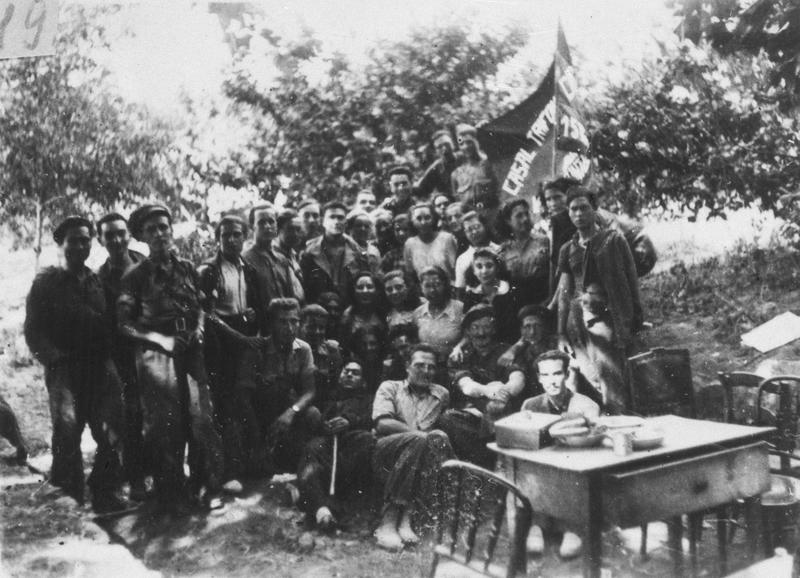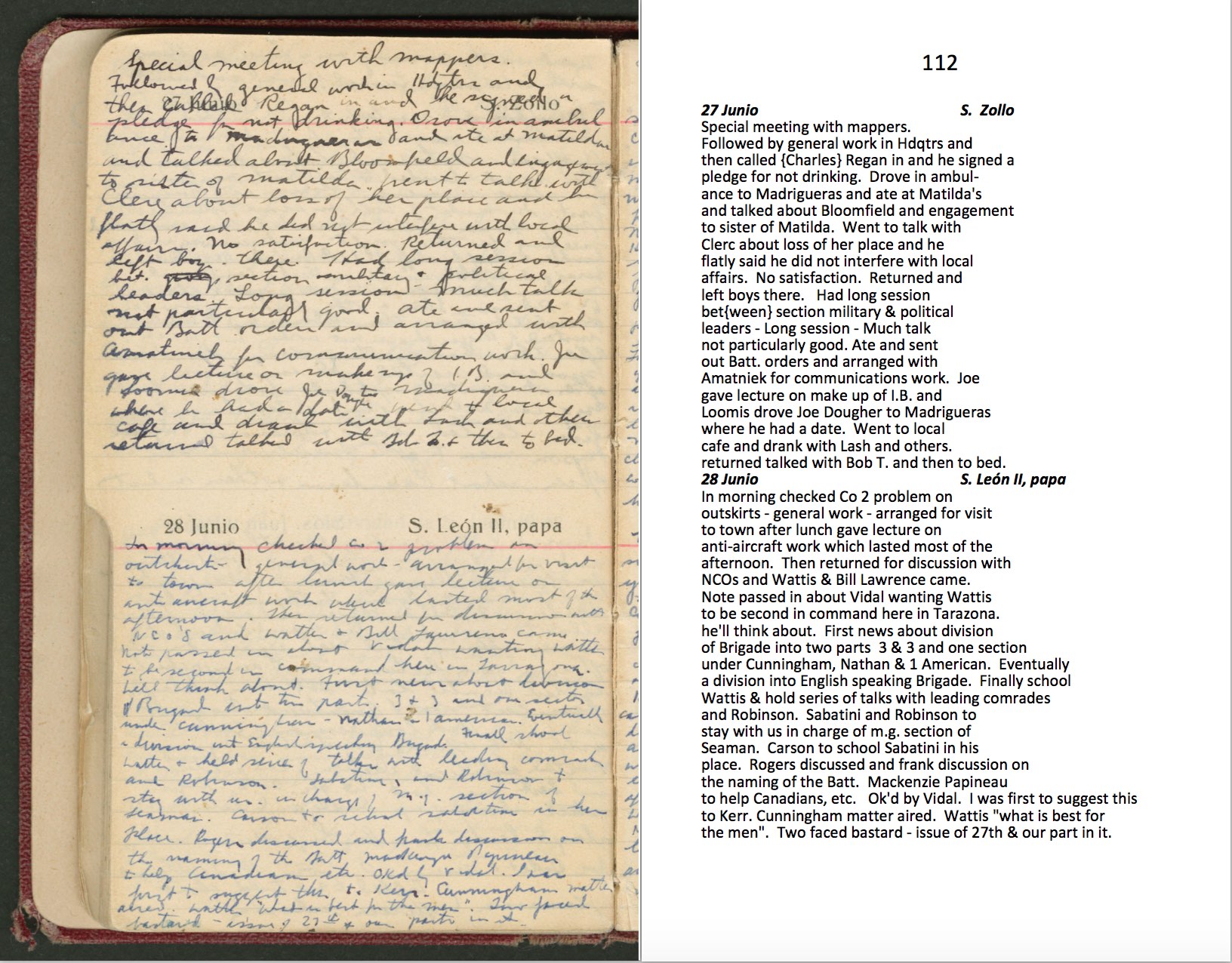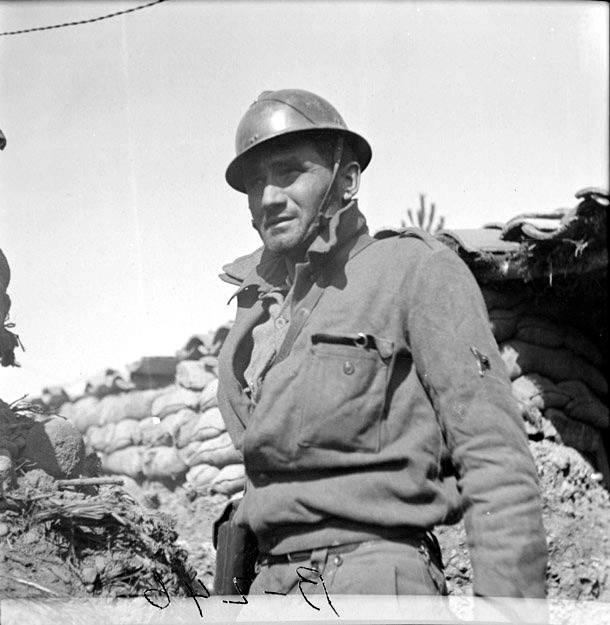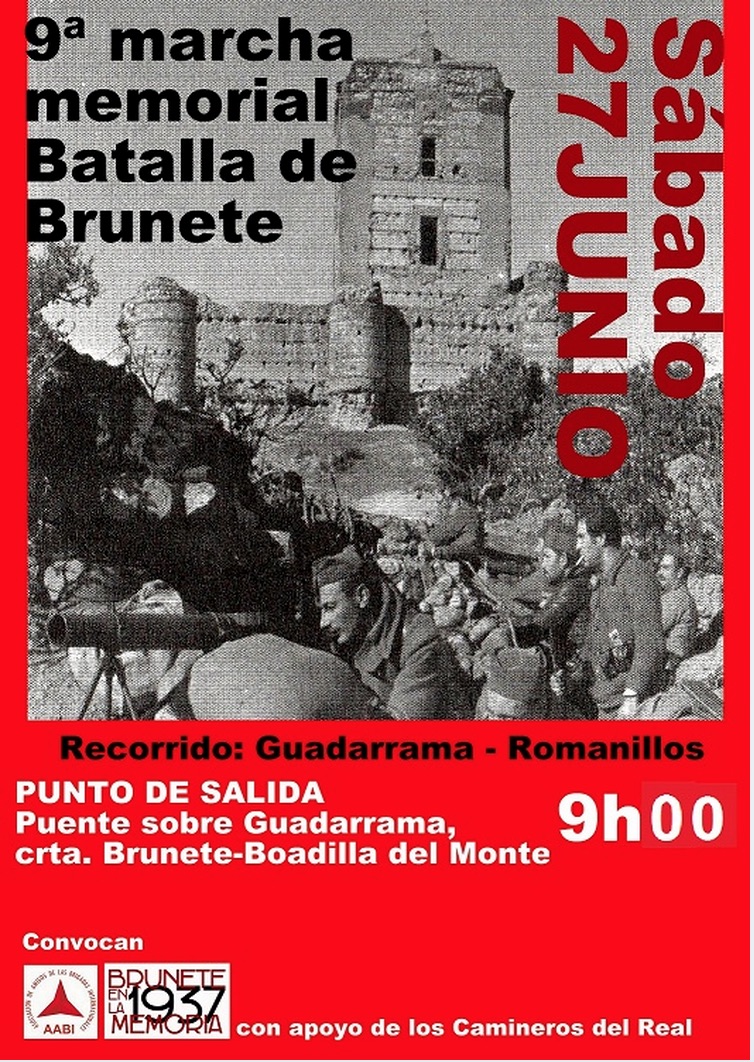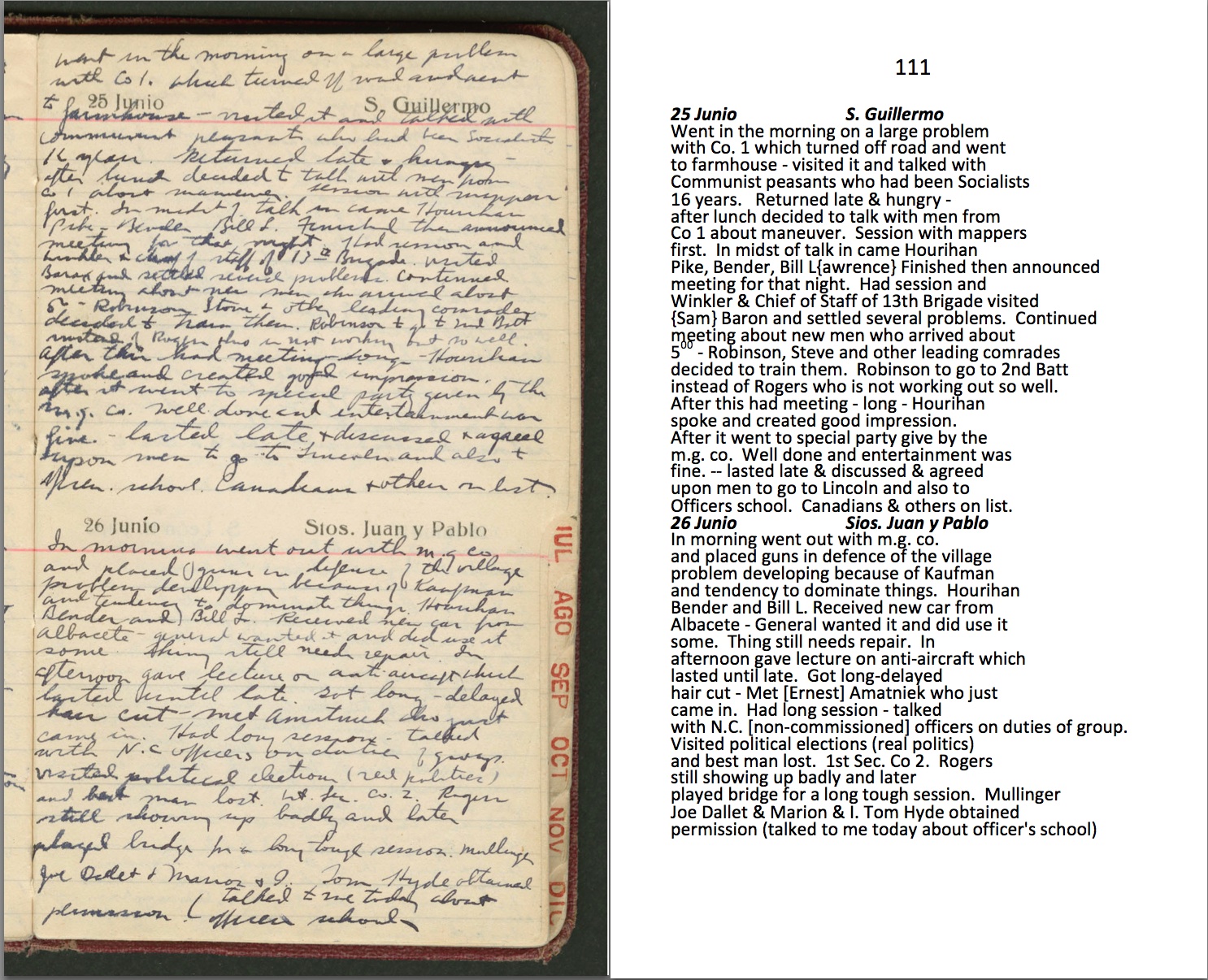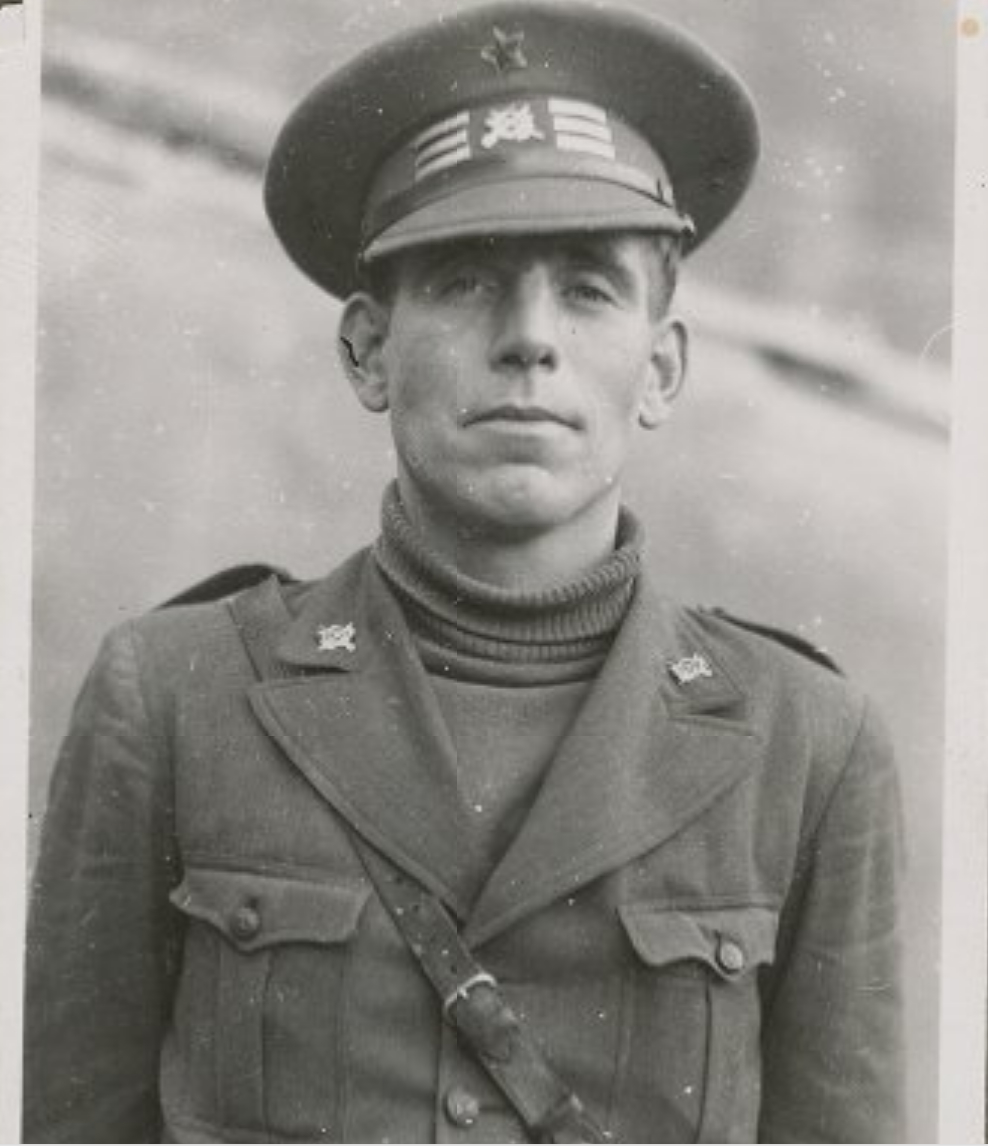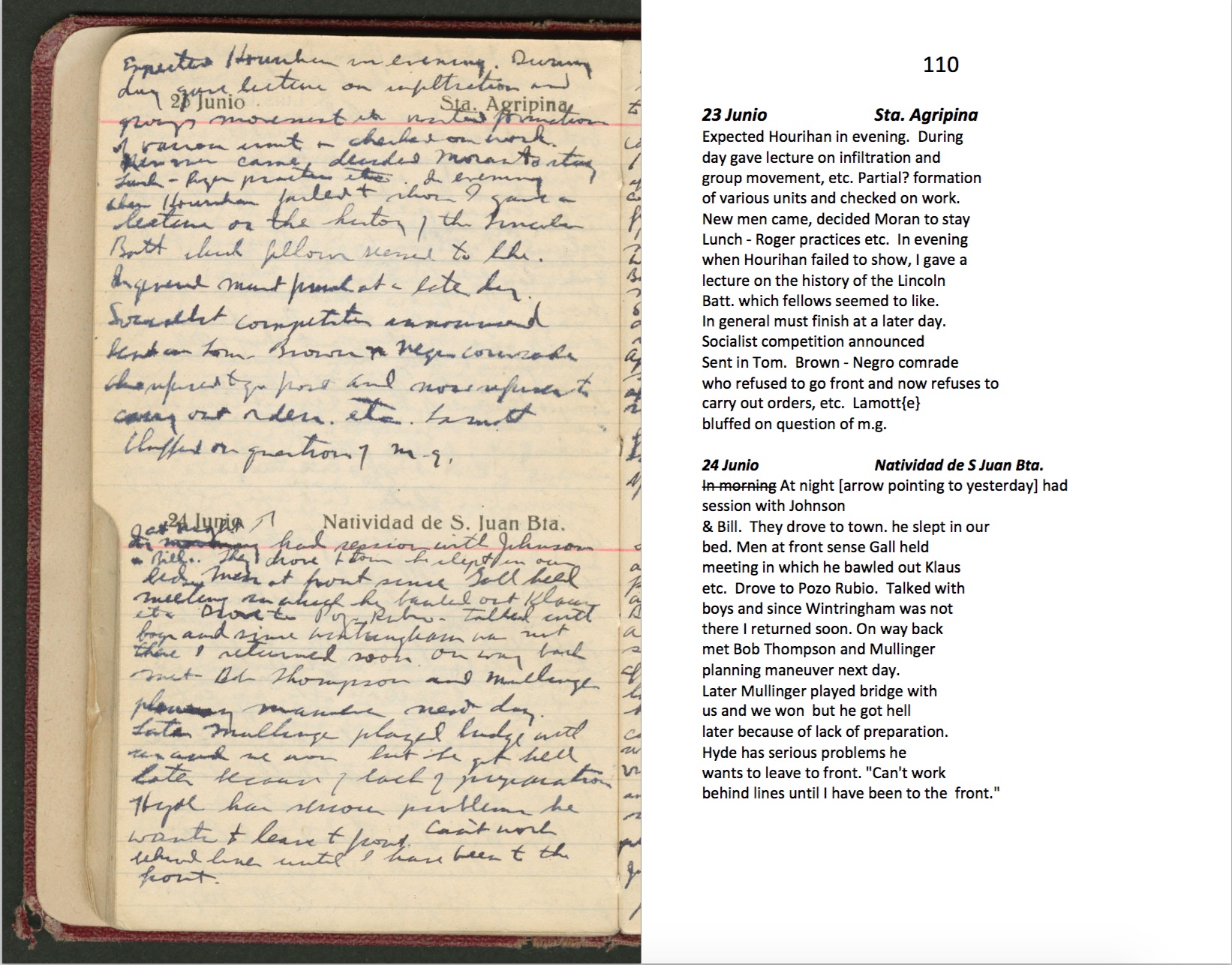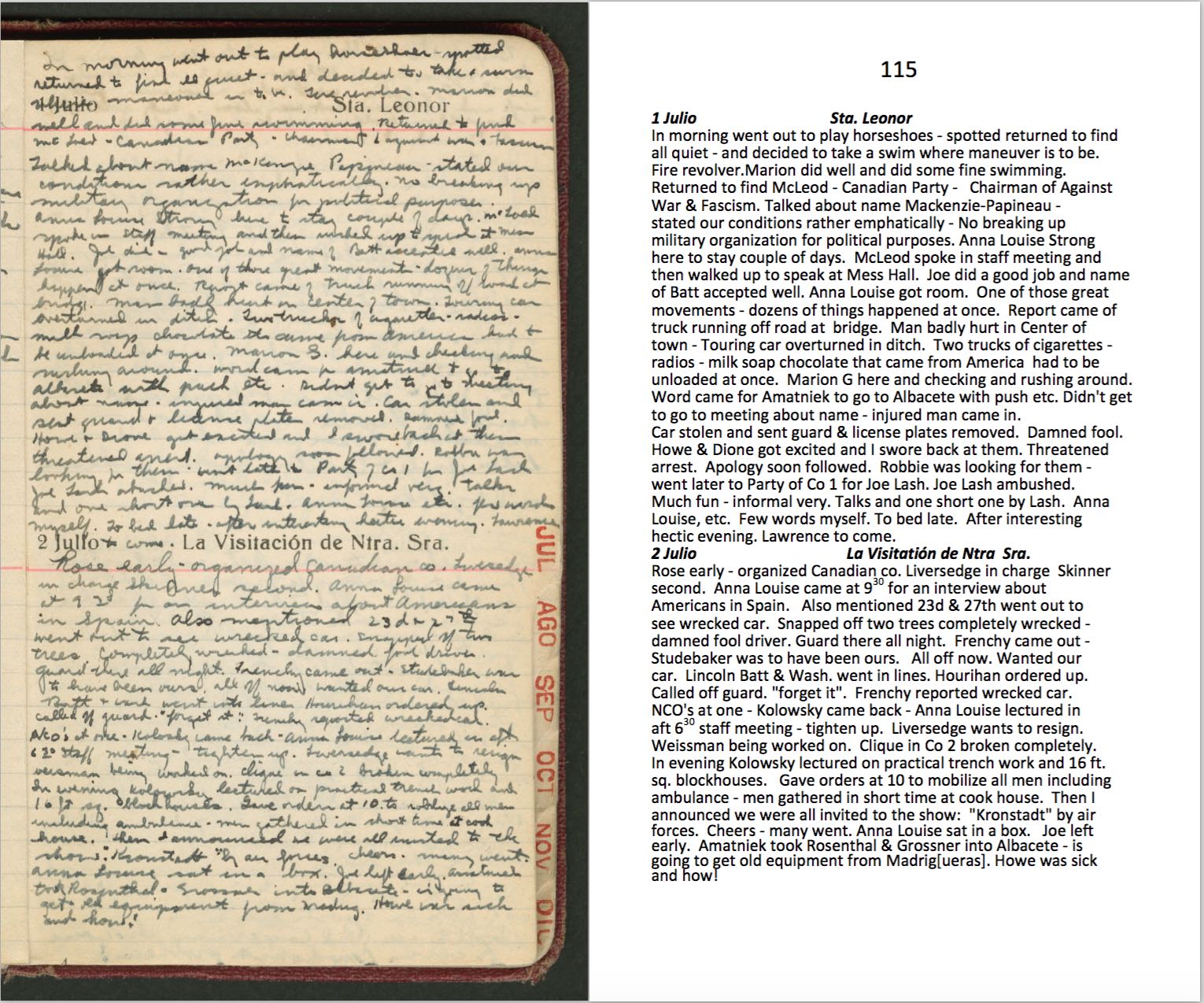
In a very busy two days in the diary, Bob Merriman tells his diary much and holds back some things he must have known. On July 2, the Lincoln and Washington Battalions were ordered up to the lines for the “push”, the Battle of Brunete. Probably for security reasons, Merriman doesn’t write much about this in his diary. Instead he deals with visitors to Tarazona de la Mancha.
July 1 was “Dominion Day” in Canada, now known as “Canada Day”, the Canadian national holiday. To recognize this, the head of the Canadian Communist Party, Albert Alexander MacLeod, showed up in Tarazona to greet the men and lecture {Note that Victor Hoar makes a mistake and says that this was Allan Dowd, unless this is an alias}.¹ They formally announce that the new Battalion will be called the Mackenzie-Papineau Battalion (Merriman misspells Mackenzie). Merriman states that this is not a political unit but a military unit, probably to assuage the Americans would be in the new Battalion. From the tone of the diary, it sounds like Joe Dallet, the Commissar, had to sell the idea of the name to the Battalion. It is likely that the Canadians were excited about having recognition. Ron Liversedge recalls the visit:
We did have one visitor to the base who was welcome, especially to us Canadians, and that was our own A. A. MacLeod. MacLeod was sat that time the national secretary of the Canadian League Against War and Fascism, and was later to serve a couple of terms as a communist MPP in the Ontario Legislative Assembly. I cannot recall the date of MacLeod’s visit, but I think it was early July, 1937. At any rate it was of great importance to us, as it was this visit that finally and officially established the Mackenzie-Papineau Battalion of the Fifteenth International Brigade. MacLeod spoke to the massed personnel of the base for two hours. He gave a history of the founding of Canada, brought in the American Revolution, the War of 1812, the defeat by the embattled Canadians of the new American republic’s attempted invasion of Canada, and finally the revolt of the early Canadians against the British Family Compact, led by Mackenzie and Papineau. There was a standing ovation for MacLeod; the Americans had never heard anything like it before. When MacLeod asked for an endorsement of a Mac-Pap Battalion, he got it one hundred per cent. The name was confirmed a few days later by the Brigades and the Spanish Government, and Canada was officially recognized in Spain as participating in the war. But not, of course, by the Canadian government.²

Another visitor, Anna Louise Strong, showed up in Tarazona. Marion Merriman and Connie de la Mora both mention Anna Louise in their memoirs and she must have been a force of nature. John Wainwright has pointed out that Anna Louise Strong’s manuscript is within the Milly Bennett papers at the Hoover Institute. In a visit in 2014, however, the author was unable to find Anna Louise’s manuscript on Spain. Anna Louise would lecture several times over the next two days. Strong was with Milly Bennett in China in the 1920’s and was editor at Moscow News in the 1930’s when Bennett was there. Much of their shared experiences in China and Russia were covered in Strong’s biography “I Change Worlds”. It was apparent that Marion Merriman was acquainted with Anna Louise before Spain. Marion Merriman Wachtel and Warren Lerude tell the story of the visit:
Anna Louise Strong arrived from America, having returned home from Russia earlier. She planned to gather information for a book on the international volunteers. We found her a room in Tarazona and caught up briefly with the news of America. She was cheered about the program to aid the Spanish children, the most terrified victims of the war, and she wanted to talk to the American Volunteers.
Anna Louise wasn’t as trying and exhausting as usual, perhaps because she herself was exhausted. She brought ten thousand dollars from an American philanthropist who wanted to buy boots for the Americans fighting in Spain. It was difficult to find boots large enough for most of the Americans. So Anna Louise set out tot find a Spanish shoe manufacturer who would make the larger-sized boots the Americans required.
After a couple of days of rest, Anna Louise summoned me, and we made the rounds of the squads and barracks so she could seek out the stories of the volunteers. She was a good speaker with a strong voice, and she was forever talking as we moved about the men. She was built like a pyramid, tall and heavily widening as her figure went earthward. The men liked her because of her enthusiasm and the simplicity of her manner The facility with which she could turn her charm on and off, almost like water from a tap, amazed me.³
Discipline still plagues Bob Merriman. Two men appear to have “organized” a Studebaker touring car, and in going AWOL and in the process of getting out of Tarazona, crashed it into a tree near the bridge in town. The car was totaled. Merriman seems to be as concerned about the loss of the car as he is disciplining the “damned fool” driver. “Frenchy” who is French Canadian Amédée Grenier¹ came out from the Auto Parc to check out the vehicle. He reported the loss of the vehicle and this would be a scandal for the new battalion who expected to get this car. Merriman wanted this car. Apparently one of the men was injured in the crash and was brought in. No guard was left on the car and so a guard would be placed on it for the next 24 hours (after removing the plates) and on the 2nd Merriman removed the guard to say “forget it” since the car was a loss.
In this incident or a simultaneous one, Seaman William Edward Howe and Joseph Raymond Dione caused problems. After taking abuse from these men, Merriman demanded and got an apology (at the threat of arrest). Howe was noted for having want to leave the Battalion and the two incidents may be related. Merriman says “Robbie” was looking for them. Robbie is John Quigley Robinson who was brought in to manage the difficult, rough and tumble Seaman who arrived in June.
Joe Lash was in Tarazona and a party was held on the evening of the 1st. Lash was “ambushed” and “much fun” was had. Anna Louise Strong also spoke to the troops in the evening with Lash and Merriman.
On the 2nd of July, Merriman formally organized the leadership of the Canadian “company”. Lieutenant Ron Liversedge is put in charge with Bill Skinner as his Alfarez. By the end of the day, Liversedge has gone to Merriman to tell him that he is not the man for the job and he returns to the ranks. In Liversedge’s memoir², he places this “stepping back” as much later in the summer, but clearly Merriman notes that it happened immediately. Bill Skinner is put in charge of the Canadians and Irving Weissman, who arrived in Spain in June, is being encouraged to step up into leadership. Hoar relates the story:
And what of Lt. Ronald Liversedge, the first officer of the original No. One Company? Within a few days after the creation of the Mac-Paps, Liversedge had resigned his commission and returned to the ranks because he refused to adhere to Merriman’s admonition that all officers should eat in the officer’s mess. Liversedge, said Merriman, was too democratic.¹
Merriman gets interviewed by Anna Louise Strong and focusses on the events of February 23 and 27. It would be very interesting to see her notes on this interview. Merriman continues to deal with the loss of the car. “All is off now”. This must have been a great disappointment to Merriman who was very peripatetic . Walter Kolowsky has come back to be a trainer.

Merriman notes that the Lincoln Battalion and the Washington Battalion are moving out. In a small hint of humor, Merriman gathers the men, including the men in Sanidad, at 10 pm and tells them they are going to the “show”. Recall that departures for the front typically happened in the middle of the night so the men may have inferred they, too, were going. When he lets them know it is the movie show, We are from Kronstadt, there is cheering. They at least would not be going to the front for now. Ernie Amatniek, however, has been ordered up and he takes Canadian Leon Rosenthal (whose residence was list as San Francisco) and Samuel Grossner with him to Albacete.
______________________________
¹ Victor Hoar, The Mackenzie-Papineau Battalion, ibid, pg 110-114.
² Ron Liversedge, Mac-Pap, ibid., pg 75-76.
³ Marion Merriman Wachtel and Warren Lerude, American Commander in Spain, ibid., pg 150.


